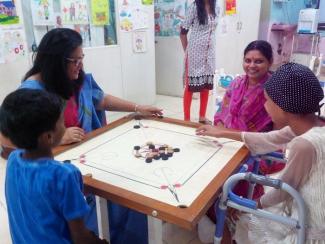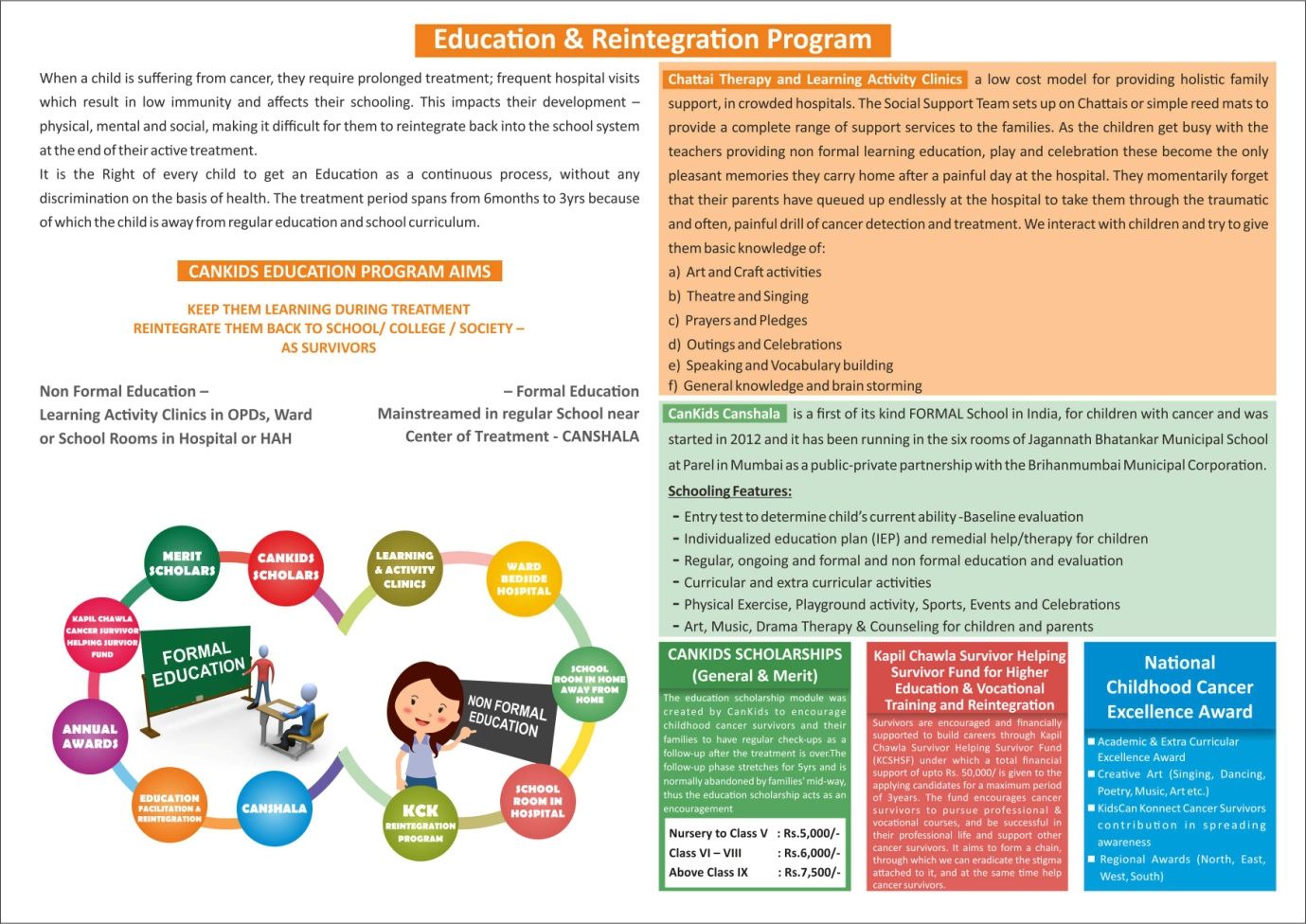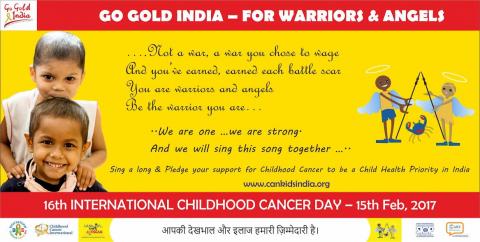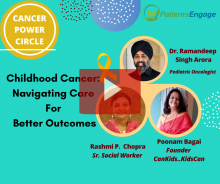
On International Childhood Cancer Day, Poonam Bagai, Founder Chairman of Cankids...Kidscan, a family support group for children suffering from cancer and their families, talks at length about how hard it is to tackle the medical and emotional wellbeing of a child who learns to grapple with reality through various stages of his treatment.
1. What are the objectives of Cankids?
CanKids...KidsCan is a National Society for Change for Childhood Cancer in India & YANA (You are not Alone) - for holistic care for children with cancer and their families. It aims to improve Survival of Children with Cancer & Quality of Life and the Rights of the Child with Cancer and the Family.
The 2 models for Change for Childhood Cancer and YANA have been built from the grass root level over the last 13 years. On the one hand it focuses on providing Social Support through CanKids Hospital Support Units and Care Centres, the range of 18 social support services and provision of Social Support teams. On the other, it enables better standards of treatment and care by building partnerships with treating centres, identifying and filling gaps year on year, setting up Stakeholder forums at regional and national levels, focusing on disease centric projects, Quality care, research and impact, building capacities and Government and Patient advocacy.
In its 13 years, over 25000 families have been registered under its YANA –You are Not Alone – signature programme that aims to provide holistic support to the child with cancer and his family, from the moment of detection, through diagnosis, treatment and after, including medical financial assistance, treatment supportive care, nutrition, accommodation, education, psychological support and information. Parents of childhood cancer survivors and those who may have lost their child to cancer, are encouraged and empowered to become a vital part of the Social Support teams as Patient Navigators and Care coordinators under a Parent Reintegration and Livelihoods programme. Childhood Cancer survivors are encouraged to join KidsCan Konnect, the teenage and young adult group of CanKids, under a burgeoning Fellowship programme, to build a community that supports, to reintegrate, and for them to become Childhood Cancer Ambassadors.
2. How are the children affected emotionally by cancer?
How children react to their illness depends upon their age, temperament, cognitive ability, level of maturity, and coping style.
But usually, from the moment a child gets sick, both the child and the family enter an emotional roller coaster. Children are stunned by the sudden move from health to illness and the unwelcome drama of tests and procedures and hospitalisation seem very frightening and overwhelming for them. Fear, anxiety, self guilt, parental neglect, anger, in fact, are the predominant emotions among children undergoing cancer treatment.
They are angry at all the difficult things they are expected to do - like taking medicines, coming to the hospital and undergoing medical procedures. And given our culture in India where children are talked over rather than “to”, no one quite realises the need to talk to them about their illness or to make them understand what is going on with them. The fear of the unknown is always with them when they know that something is wrong with them but no one tells you what it is actually.
Feelings of guilt are also common among children, they worry that maybe they have cancer because they were bad in some way or had bad thoughts. They also may feel guilty that they are responsible for this family crisis and are concerned about the impact on their parents, especially when parents are in conflict or divorced or have serious individual problems. Sometimes they feel sad at realising that they are now different from their peers. They may feel depressed at thinking about the months of treatment facing them and how it will interfere with their life. They think about the changes their bodies will undergo and are depressed about how they will look and how their friends may view them. They may even feel a sense of hopelessness, fearing that the treatment will not work.
3. What are the techniques you use to build resilience in the kids with cancer?
Resilience is an individual’s capacity to maintain psychological and physical well-being in the face of any kind of stress situation. We cannot always protect children from experiencing stress and distress, but we can help them develop skills to be able to handle those moments well, grow in the face of challenge, and continue, perhaps not untouched but hopefully undamaged.
In Cankids our first step is to reach out to children and their families who need help with their cancer treatment. Outside support and inner strength work together to develop resilience. There are 3 programmes that specifically focus on the children
A . The Education and Learning Programme – which keeps them learning during treatment and helps them to get back to School
B . The Pediatric Psycho – Oncology Programme’
C . Kidscan Konnect – our Teenage and Young Adult Childhood Cancer Survivor Group – for age 13 and up.
Cankids Pediatric Psycho-oncology (PPOP) programme is specifically developed to focus on children. It includes: -
- 1-1 Special Intervention Counselling Clinics : Building a close, loving relationship with children is the most important thing we can do to support their resilience.
- Group Therapies, Sharing Caring Sessions, Survivor Assistance Programmes and Relaxation exercises which help develop self-Control and build self-regulation.
- Expressive Therapies : Providing a dose of laughter through Clown Therapy: Laughter itself is a great form of emotional release for children and their caregivers thus helping them to be resilient in stressful situations like undergoing cancer treatment.
- Music Therapy: Music therapy is the practice of using music to address the physical and emotional needs in a therapeutic environment
- Developing Thinking Skills through Play and Story Telling: Children are encouraged to find their own bit of reality through this.
- Child Life Programme –This includes child friendly wards, toy book bank libraries, Hospital dolls, Handy candy programme, celebrations, outings and birthday parties of the month.
- Encouraging responsibility and participation through celebrations and outings as also creating a beautiful environment by sprucing up hospital wards so that children can be made to feel as normal as possible
- Providing positive role models: Children learn life skills by watching and copying adults. We connect our children with role models who have conquered cancer and encourage them to share their success stories with them.
4. How do you support the emotional wellbeing of the parents of the kids with cancer?
Cancer treatment process can be psychologically devastating for children as well as their parents facing serious cancer diagnoses. Under ‘YANA – Hold my Hand’, a parent from the Cankids Parent Support group is assigned the family to be their direct “lifeline” and point of contact through the treatment journey. Yana provides a range of services including emotional support and treatment supportive care. Some parents also require psychological intervention, which is when they are referred to the Psycho-Oncology team which then focuses on providing a child/caregiver friendly environment, essential for effective treatment.
5. What are the challenges in children reintegrating back into school and normal life? How do you support reintegration of the children back into society?
When a child is suffering from cancer, they require prolonged treatment - frequent hospital visits which result in low immunity affecting their schooling. This naturally impacts their all round development making it difficult for them to reintegrate back into the school system at the end of their active treatment. The Education & Reintegration Programme keeps the children learning during treatment by even running school rooms in the hospitals and also helps them reintegrate back into society.
Kids can Konnect – Cankids Teenage & young Adult childhood cancer Survivor Group also focuses on peer support, self help, management of late side effects and reintegration of survivors back to school, college and society.

6. Is treatment adherence a challenge and what can be done about it?
Treatment adherence remains a challenge right from the onset till the completion of treatment. A particularly "severe" form of treatment non-adherence is when the family does not complete or even start treatment (called "treatment abandonment").
Some reasons for treatment non-adherence are universal e.g. teenagers with cancer, while others are more specific to resource limited settings like India. These include treatment non-adherence or abandonment seen in the female child, those from poor socio-economic status, those with significant side-effects, those who have not been counselled adequately, those who have to travel long distances, etc. Some of this relates to disease and its treatment, but lot of it also relates to patient support and counselling.
7. How do children cope with long term side effects of medication?
All modalities of treatment of cancer in children - medicines (chemotherapy), radiation and surgery may have some side-effects which may be acute (during treatment) or late (develop after completion of treatment, often after a few years). The risk of late effects depends on the cancer and the intensity of treatment. For many cancers the risk may be low or even negligible (e.g. standard risk acute lymphoblastic leukemia or early stage Wilms tumour) while for others it may be relatively higher (e.g. sarcomas or brain tumours needing radiation and chemotherapy).
The way to help children and their families cope with them has to start from making them aware of what they are at risk of and what can be done to prevent it (e.g. healthy eating, exercise, avoiding smoking, etc.)

The world over as more and more children are surviving cancer, increasing research and effort is going into minimising the late side effects of childhood cancer treatment. In India too efforts are being made.
At Cankids the KCK is pushing and taking a lead to advocate… and participate in research, and create awareness. A Survivor Passport Project and a Fertility project are under way.
8. What do you hope for on this International Childhood Cancer Day?
International Childhood Cancer Day is celebrated every year on 15th February to honour the bravery and courage of children with cancer and their families, to create Childhood Cancer Awareness, and to fight the Stigma in our Society with the message – “Childhood Cancer is Curable – when detected in time and treated properly at a Cancer Centre“
Although childhood cancers are rare, and account for 3-4% of all cancers, there are 3 key reasons why Childhood Cancer must be a child health priority and a vital part of the Cancer Control Programme of the country.
- Worldwide, more than 250-300, 000 children and adolescents ( 0-18 years) are diagnosed with one of 16 forms of childhood cancer-cancers, of which 20% ( 50- 60000) are from India alone.
- As against Adult cancer Survival rates of 50%, childhood cancers survivals can be 70-95%
- In India, survival rates for childhood cancers, as for adult cancers can be as low as 30-40%, because of poor access to care, lack of information and awareness, late diagnosis, few good cancer treatment centres offering quality treatment, care and support and Stigma of Cancer – resulting in a disbelief that Childhood Cancer is Curable.
The Go Gold India campaign, is led by Childhood Cancer Survivors, with 8 demands –
- for a clear childhood cancer control plan and policy,
- more and dedicated pediatric oncology cancer centres,
- better and qualified manpower and health professionals,
- affordable but quality treatment and drugs,
- focused interventions for specific childhood cancers that are highly curable like Hodgkins Lymphoma, Retinoblastoma ( eye cancer) and Wilms Tumor ( kidney cancer) ,
- acceptance of the age of childhood cancer upto 18 years of age,
- and family and civil society engagement.
9. What have been your main challenges?
Building the models for Change for childhood cancer and YANA - for holistic care for children with cancer and families at grass root levels over the last 13 years has been exciting and challenging.
Cankids began as a volunteer driven organisation and over time social support teams and project management staff have been recruited to ensure the delivery of its programmes and services.
The biggest challenge as we are scaling up to go PAN India is resources - manpower and funds.








